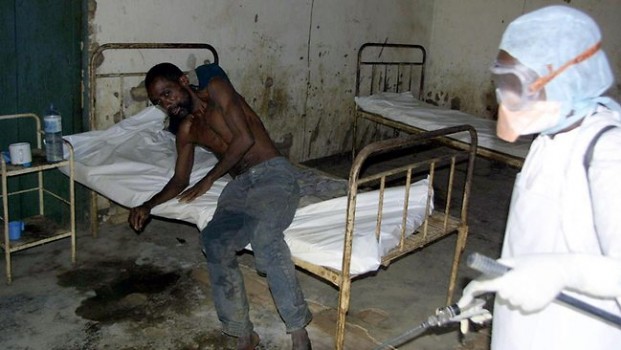Myron M. Levine, MD, DTPH, director of the University of Maryland School of Medicine Center for Vaccine Development (CVD), and Dean E. Albert Reece, MD, PhD, MBA, announced today the start of a clinical trial in Baltimore to evaluate different dosage levels of a promising experimental Ebola vaccine developed by the Vaccine Research Center (VRC) of the National Institute of Allergy and Infectious Diseases (NIAID), part of the National Institutes of Health, and GlaxoSmithKline (GSK).

The Baltimore study is the second Ebola vaccine trial being led by the CVD, the first currently taking place in Mali, West Africa. The Mali trial is being performed by CVD-Mali in partnership with the Ministry of Health of Mali.
Physicians, nurses and other health care workers provide invaluable medical care and disease control assistance to countries in sub-Saharan Africa during outbreaks of Ebola virus disease. This has been particularly true during the enormous current epidemic in West Africa, by far the largest Ebola outbreak in history. These include volunteers from the U.S., European, and other countries working alongside local healthcare workers, who are all at risk of infection if there is any breach in protocol of use of personal protective equipment. For this reason, health care workers constitute one of the target populations for whom a future safe and effective Ebola vaccine will be useful. Versions of this Ebola vaccine, developed by the VRC and GSK, are currently undergoing clinical trials in the U.S., the United Kingdom, Switzerland, and Mali. One is a combination vaccine that is expected to protect against the two major species of Ebola virus, including Zaire species (the one causing the epidemic in West Africa) and Sudan species. The other vaccine is aimed at preventing only disease caused by the Zaire species of Ebola virus.
The CVD arm of the trial has vaccinated 20 subjects, half at one dose, half at another. The study will provide important results about the safety of the different doses and their ability to stimulate immune responses. Preliminary results could be available within four to eight weeks. The trial’s principal investigator is
Kirsten Lyke, MD, associate professor at the School of Medicine and a faculty member at the CVD (shown in photo).
“This is a key step in the accelerated Ebola vaccine testing process,” says Levine. “Specifically, Dr. Lyke’s Baltimore trial of the NIH Ebola vaccine will provide critical early information about whether the vaccine is well tolerated by healthy adults in the U.S. and will assess the strength of the immune responses that they mount. This information will ultimately be relevant for future use of this vaccine in U.S. (and other industrialized country) adults such as health care workers and military personnel who may have to be deployed in areas where Ebola outbreaks are underway. The Baltimore trial will also allow a comparison of results with those being generated in West African health care workers from parallel trials being carried out by CVD-Mali.”
The vaccine consists of an adenovirus (cold virus) that has been modified so that, in humans, it does not cause illness and cannot multiply. It does not contain the entire virus, but a single Ebola protein. Immune responses directed against this attachment protein have been shown to be highly protective in animal studies (which are carried out under the highest level of physical containment). Researchers hope that the vaccine will elicit a similar response in humans and will be robust enough to protect them from the disease.
The vaccine was developed by investigators at the NIAID’s VRC in Bethesda, Md., and Okairos, a biotechnology company acquired by GSK in 2013.
“I am proud that Dr. Lyke, Dr. Levine and the entire CVD team are on the front lines of the fight against Ebola,” says Reece, who is also vice president of medical affairs at the University of Maryland and the John Z. and Akiko Bowers Distinguished Professor at the University of Maryland School of Medicine. “This is just one example of how we are responding to international health crises, not only Ebola, but others such as malaria and pandemic flu.”
The trials in Baltimore and Mali will complement each other. Comparing the clinical acceptability and immune responses of subjects in the U.S. and in West Africa given the different dosage levels of vaccine will help GSK to select the most appropriate dosage level for larger field trials and eventually, large-scale manufacture.
“Working with partners including the CVD and VRC, we are accelerating development of this Ebola candidate vaccine at an unprecedented rate to try to help with the control of this terrible outbreak,” said Ripley Ballou, MD, head of Ebola vaccine research at GSK.
More than four decades of work have earned the University of Maryland School of Medicine CVD an international reputation for creating and testing vaccines against cholera, typhoid, non-typhoidal Salmonella, dysentery, malaria, and multiple other infectious diseases, including influenza. In addition to its research and outpatient facilities in Baltimore, the center conducts extensive research in Africa, Asia and Latin America.
–
Source: http://www.oea.umaryland.edu/communications/news/?ViewStatus=FullArticle&articleDetail=23670






